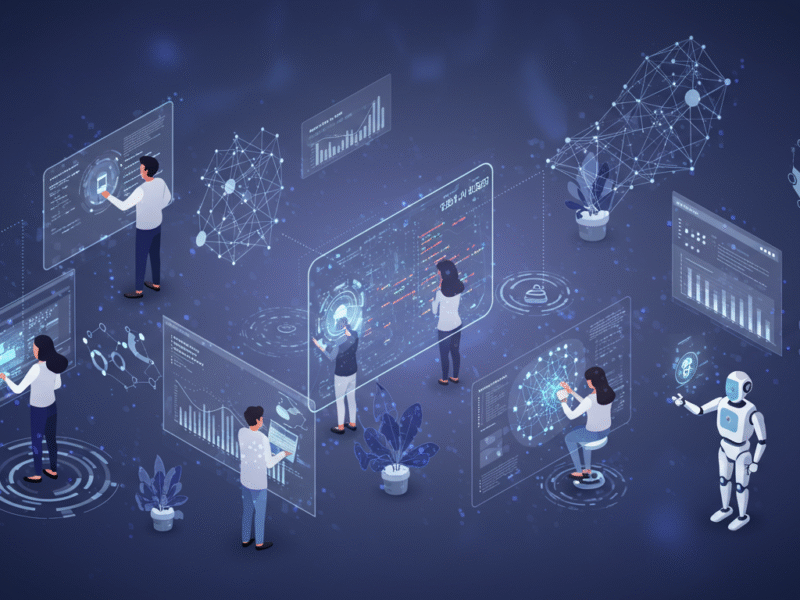Today, data is incredibly valuable. As a result, the people who can use that data to make smart decisions are some of the most important players in the industry. As we stand here in 2025, one career shines brighter than most in the tech world: the Machine Learning Engineer. This isn’t just another job. In fact, it’s a role that is actively creating the future. Machine Learning Engineers, or ML Engineers, build the brains behind things like self-driving cars, personalized movie suggestions, and medical tools that are changing our lives. Therefore, if you’re looking for a career that is building tomorrow, understanding this role is your first step.
What Exactly Does a Machine Learning Engineer Do?
Before we look at the skills and pay, let’s first explain the job title. What does an ML Engineer do every day? Simply put, an ML Engineer is a special kind of software engineer. Their main job is to design, build, and launch machine learning systems. They are the key link between the ideas of data science and the real-world software that people use.
For instance, imagine a team of data scientists creates a great new algorithm, or “model,” that can predict which customers might leave a service. This model, however, is just code on a computer. This is where the ML Engineer comes in. They take that model and make it work in the real world. Consequently, they figure out how to scale the model so it can handle millions of user requests on a company’s website. They also make sure it runs well, is dependable, and keeps learning over time.
Their duties are a unique mix of skills, which often include:
- Designing and Building ML Systems: They create systems that can handle data, train models, and make predictions on new information.
- Preparing Data: Raw data is almost always messy. ML Engineers work with large amounts of data to clean it up. They also select the most important pieces of information, or “features,” that the model will use.
- Putting Models into Production (MLOps): This is a main part of their job. They are in charge of the “operations” side of machine learning, known as MLOps. This means launching models into live business environments and setting up systems to watch their performance.
- Improving and Retraining Models: A model’s accuracy can drop over time. For this reason, ML Engineers constantly check on the models and retrain them with new data to keep them accurate.
- Working with Teams: They also work closely with data scientists, other engineers, and business leaders. This teamwork is necessary to turn business problems into machine learning solutions.
Think of it this way: a data scientist is like an architect who designs a skyscraper’s blueprint (the ML model). In that case, the Machine Learning Engineer is the construction manager who builds, maintains, and makes sure the skyscraper can handle real-world use.
Why is Machine Learning Engineer the Career of 2025?
The demand for Machine Learning Engineers isn’t just high; it’s growing very fast. A few powerful reasons are making this one of the safest and best-paying careers you can choose today.
The Explosion of Data and AI
First of all, we are creating more data than ever before. Every click, every online purchase, and every social media post adds to a global ocean of information. Companies in every field, from finance to healthcare, now see this data as a huge asset. However, data by itself is not useful. Machine learning is the key that unlocks its true value.
As a result, businesses are using ML for many things:
- Personalization: Think of Netflix recommending shows you might like. This is powered by ML.
- Automation: Furthermore, ML automates tasks that were once done by hand, like spotting credit card fraud.
- Predictions: Companies use ML to guess future sales and predict when factory machines might break.
- Innovation: Entirely new products, like voice assistants and self-driving cars, are created using machine learning.
Because of this AI revolution, the need for engineers who can build these smart systems is soaring.
Making a Real-World Impact
Besides the high demand, the work itself is very meaningful. ML Engineers are not just writing code. Instead, they are solving real problems. For example, an ML Engineer at a healthcare company might build a system that helps doctors find diseases earlier. Another one at a retail company could create a system that saves millions by improving the supply chain. This direct link to a positive outcome leads to great job satisfaction.
Excellent Pay and Career Paths
Finally, let’s talk about the salary. Due to the high demand and advanced skills needed, Machine Learning Engineer salaries are among the best in the tech world. Companies are ready to pay top dollar for this talent. The career also offers many chances for growth. An ML Engineer can become a Senior Engineer, a team leader, or even a manager like the Head of AI.
The Essential Toolkit: Skills You Need to Succeed
Becoming a Machine Learning Engineer requires a good mix of tech skills and important soft skills. It’s a tough path, but it’s also a very rewarding one.
Foundational Technical Skills
Here are the core technical skills you’ll need to master.
- Mastering Programming (Python is King): Python is the main language used for machine learning. You must have a strong grasp of it and its key libraries like NumPy, Pandas, and Scikit-learn.
- Core Computer Science: You need to know how to write code that is fast and efficient. This is a basic requirement for building high-quality ML systems.
- Understanding ML Theory: You should also understand how different algorithms work, including ideas from statistics, probability, and deep learning.
- Key Frameworks and Tools: You will need hands-on experience with major deep learning frameworks like TensorFlow and PyTorch.
- MLOps and the Cloud: Moreover, you need skills with a major cloud provider like Amazon Web Services (AWS), Google Cloud Platform (GCP), or Microsoft Azure.
Crucial Soft Skills
Technical skills are only half the story. The best ML Engineers are also great communicators and teammates.
- Problem-Solving: This job is all about solving difficult problems. You need a sharp mind and the ability to break down big challenges into smaller steps.
- Communication: You must be able to explain complex ideas to people who are not technical. This is a vital skill for success.
- Collaboration: Machine learning is a team sport. Therefore, you will need to work well with others and be open to new ideas.
- Lifelong Learning: The world of AI changes incredibly fast. You must have a real desire to keep learning to stay current.
Your Roadmap: How to Become a Machine Learning Engineer
There are several paths you can take to become an ML Engineer. This guide breaks the journey down into two main phases.
Phase 1: Building Your Foundation
This first phase is all about learning the core skills you’ll need for the job.
- Step 1: Get a Good Education. A university degree in a field like Computer Science is the most common starting point. However, online courses from sites like Coursera and edX are also fantastic for learning practical skills. For a faster path, a data science bootcamp can be a good choice.
- Step 2: Master the Core Technical Skills. Focus on the tools mentioned earlier. You should start with the basics, like Python, and then move on to more advanced topics. It’s very important to practice by working on your own small projects.
Phase 2: Proving Your Abilities
Once you have the knowledge, you need to show employers what you can do.
- Step 3: Build an Amazing Project Portfolio. This is the most important step. A portfolio of your work is proof of your skills. You can start with practice sites like Kaggle and then move on to developing your own projects from start to finish. Be sure to build a simple web application that uses your model to show off your MLOps skills.
- Step 4: Gain Experience and Network. If you’re a student, an internship is the best way to get real-world experience. You can also contribute to open-source ML projects online. In addition, you should connect with people in the field on LinkedIn and at local tech events. Networking can often lead to job opportunities.
A Day in the Life: What the Job is Really Like
A typical day for an ML Engineer is often focused on data and technical systems, not just designing algorithms. A day might include:
- A quick morning meeting with the team to discuss daily goals.
- Writing code to clean and prepare data for the models.
- Building data pipelines or writing code to train a model.
- Figuring out why a model in production is not working right.
- Talking with data scientists and managers about project goals.
- Checking dashboards to see how deployed models are performing.
In short, it’s a role that requires focus, patience, and a genuine love for solving technical puzzles.
The Future of Machine Learning Engineering
The field is still young and changing quickly. Looking ahead, a few trends are shaping this career.
- The Rise of MLOps: The focus will continue to shift from just building models to creating automated systems that manage the entire process.
- Specialization: As the field grows, engineers will likely specialize in areas like Natural Language Processing (NLP) or Computer Vision.
- AI Ethics: Importantly, there is a growing focus on the ethical side of AI. Future engineers will need skills to build models that are fair and unbiased.
The role of the Machine Learning Engineer is not just a job; it’s a commitment to being at the center of how technology is changing our world. The path is challenging, but the rewards are huge.
To dive deeper into the practical skills needed, you can explore learning paths on platforms like Coursera. For job seekers, browsing current openings on LinkedIn can provide a real-time look at the skills employers want right now.











